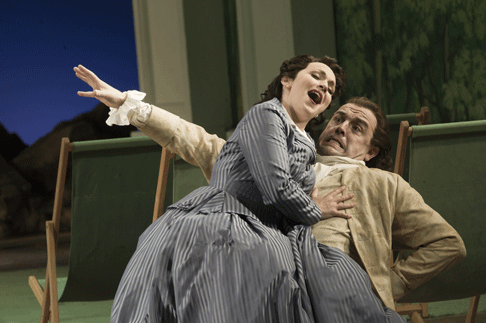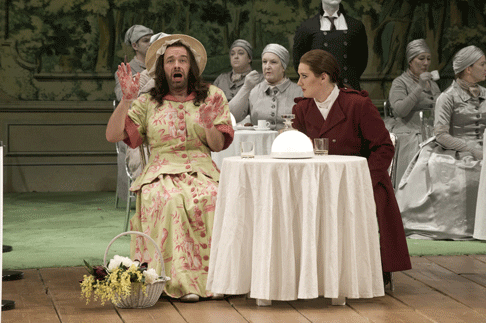Receiving its 6th revival on 15
September 2014, revival director Michael Walling, the production is looking as
fresh as ever with David Fielding’s designs still bright and crisp. ENO
fielded a strong cast mixing experienced singers and newcomers. Mezzo-soprano
Alice Coote sang the
title role; an experienced Handelian this was her role debut. Having sung
Atalanta in the last revival of the production (in 2002) Sarah
Tynan moved onto sing Romilda, the more serious dramatic of the two soprano
roles. The soubrette role of Atalanta was sung by Harewood Young Artist Rhian Lois, whilst another Harewood
Young Artist, Catherine Young sang Amastris. Counter-tenor Andrew
Watts sang Arsamenes, with Neal
Davies as Ariodates and Adrian
Powter as Elviro. Michael
Hofstetter conducted.
Hofstetter is the Principal Conductor of the Grossess Orchester Graz and
made his ENO debut with La Traviata. But his background is also in
early music and he launched the overture at quite a considerable speed. The ENO
Orchestra responded brilliantly but I did rather worry about the health of the
performance. In fact, I need not have worried and Hofstetter proved a
responsive conductor, keeping the show moving but never rushing the singers off
their feet.
Whilst the production is in good health, I did rather worry that the general
tone had become a little more flippant and satirical than formerly. I was
assured by others present that this was not so; Nicholas Hytner was in the
audience and reputedly was happy with the revival. It is, after all, 29 years
since I saw the opening run with Ann Murray and Valerie Masterson and not only
does memory play tricks but my own conception of Handelian opera seria has
changed.
 Rhian Lois as Atalanta and Andrew Watts as Arsamenes
Rhian Lois as Atalanta and Andrew Watts as Arsamenes
Not that Xerxes is in any way typical of Handel’s opera. Handel
always seems to have had a fondness for using librettos taken from 17th century
Venetian operas, but in Xerxes he seems to have kept rather closer to
the original. The opera has far more short arias and far fewer extended da
capo arias than is general in Handel. And, whilst the piece is not
strictly a comedy, it does mix the serious with the satirical in a way which is
sometimes downright comic. But getting the tone right is essential. When Act 2
comes, and we have all five principals (Xerxes, Romilda, Arsamenes, Atalanta
and Amastris) having problems in love and addressing us in serious tones, it is
essential that we believe in them as people. They might get up to comic
business, but their emotions are very real. By and large Walling got this
right.
Alice Coote’s Xerxes was superbly sung, covering the full range from the
short lyric arias through the virtuoso bluff and bluster to the intense pain of
the extended da capo arias. Coote has a very personal way with Handel and her
performance was a very individual one. Musically she took her time over some
things, but showed herself equally capable of bravura passagework. Similarly,
in terms of character, she projected Xerxes’ changeability quite brilliantly.
Her conception of Xerxes might be rather more flippant than some, but she
certainly brought out the idea that living with him was very much living on the
edge. You never knew what might happen.
Equally captivating and profoundly poised was Sarah Tynan as Romilda. She
started out giving the character a lighter, slightly satirical edge as if she
had not left Atalanta behind, but Tynan’s Romilda develop a superb depth.
Tynan’s Handel singing is still crystalline and clear, with a lovely sense of
style. In fact, the Romilda she reminded me of most was the original one in
this production, Valerie Masterson. Tynan didn’t just sing superbly, but
brought a real depth to the bleaker moments when Romilda says that if she
can’t be with Arsamenes then she will die. Tynan made us believe it, whilst
sounding superbly beautiful.
 Adrian Powter as Elviro and Catherine Young as Amastris
Adrian Powter as Elviro and Catherine Young as Amastris
Rhian Lois, singing her first Handel opera role, was a great delight as
Atalanta. Her coloratura was pin sharp and she was wonderfully sparky (perhaps
too much so at first) but she also brought out the more serious moments when
the mask slipped. And she developed a very vital relationship with Sarah
Tynan’s Romilda. Perhaps Lois took a little time to work up a full head of
steam, but that is understandable.
Also singing her first role in Handel opera, Catherine Young made a
strikingly tall Amastris. She has a lovely soft-grained voice which you sense
will become a great asset in a number of trouser roles; a Xerxes in the making.
But Amastris was written for a robust contralto voice and there were moments
when, though singing musically and intelligently, Young lacked the necessary
heft.
Arsamenes is one of the characters in the opera who gets virtually no comic
moments. Andrew Watts was suitably intense and, in the more lyrical arias with
great beauty and a lovely sense of Handelian line. But in the more stressful
arias, he had a tendency to push his voice too much so that a hardness crept in
and there were rather too many acuti which would have been better missed out.
This was a shame, because this was a performance of great strength and
intensity.
Adrian Powter made a delightful Elviro with good comic timing. He gamely
appeared in a dress for act two (definitely not on the original production) and
with his beard and long hair, looked startlingly like Conchita Wurst. Neal
Davies made what he could of Ariodates giving him a bluff idiocy which was
entirely apt and singing the more bravura moments finely.
Hofstetter and the orchestra were on fine form throughout the opera,
providing a crisp and nicely historically informed accompaniment.
This was an admirably strong revival, showcasing some extremely fine Handel
singing and a production in robust health. Here’s to another 30 years.
Robert Hugill
Cast and production information:
Xerxes: Alice Coote; Romilda: Sarah Tynan; Atalanta: Rhian Lois; Arsamenes: Andrew Watts; Amastris: Catherine Young; Ariodates: Neal Davies; Elviro: Adrian Powter. Director: Nicholas Hytner; Revival Director: Michael Welling. Conductor: Michael Hofstetter. English National Opera at the London Coliseum, 15 September 2014.
image=http://www.operatoday.com/ENO-Xerxes–Coote_Tynan.gif
image_description=Alice Coote as Xerxes and Sarah Tynan as Romilda [Photo ENO / Mike Hoban]
product=yes
product_title=Xerxes, ENO
product_by=A review by Robert Hugill
product_id=Above: Alice Coote as Xerxes and Sarah Tynan as Romilda
Photos © ENO / Mike Hoban